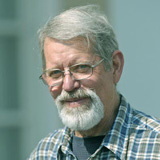Prison’s Harshest Judgment
Scarlet Letter of 'ChoMo'
JUNE 10, 2016: I was seated at the “white” table waiting for my “Team Meeting” with the prison staff. I sat with my back to the table, leaning back and watching the silent television. You can hear the television through a radio and earplugs if you purchase them from the commissary, but I was grateful to just sit without listening and wait for my turn for my meeting.

Larry (not his real name) happened to walk by and, recognizing him as a coworker from food service where I am assigned to work in the prison, I engaged him in conversation. We spoke for less than five minutes, but when he left, two men sitting behind me addressed me, “Hey, don’t be talking to him, man!”
“Because?” I asked.
“Because he’s a f-cking ChoMo man!”
“Really? … I didn’t know,” I responded.
“Hey, we don’t f-cking want him around our f-cking table, okay? These guys are scum, okay? I mean they’re not even f-cking human, okay? They’re f-cking animals! They’re the guys who go out one day and don’t come back, okay?”
“Sorry,” I said, “I didn’t know.”
Later, after my Team Meeting, I was back in my cell catching up on some correspondence when another man stopped by to say, “Hey man, you can’t be talking to the ChoMos like that.”
If there were a Scarlet Letter for prison, the “child molesters” would be wearing it. They have to sit at a separate table, and when not eating, they are confined mostly to their cells, traveling through the common area only to go to the rec deck or the ice machine or the hot water dispenser.
Near as I can tell, a ChoMo is anyone who has been convicted of a crime with a minor, and those crimes run the gamut from viewing child pornography to having a relationship with someone under 18 years of age to molesting children. It’s all one category, and the level of raw disgust and disdain among the other inmates is profound.
Since at meals there are not enough seats at the “white” table to accommodate all of the whites, I generally take my meal tray back to my cell to eat in comparative quiet. So I had never taken the time to study the “ChoMo” table to inform myself of who was in that category.
It turns out that this was a big mistake on my part. I have now been castigated on two occasions for having a conversation with men I did not know were “ChoMos.” I had even on three occasions attended the ChoMo Bible study. It was a shock (and a little unnerving) to find that my reputation, and possibly my safety, were at risk, and I didn’t even know it.
I’m not naive regarding child molestation or the devastating life-long effects it can have on the victims. And I get the same feelings as most for one who has visited some particularly heinous act on a defenseless child. But there is also a part of me that feels that removal from society and protection for possible future victims is punishment enough, especially when that punishment is within the confines of the harsh environment of prison.
It is not for me to forgive the perpetrator; that is for the victim. But neither is it for me to declare any man no longer human but an animal with no possibility of redemption, and whose only proper place is in Hell.
None of us are God. But it’s dismaying to me that most inmates here, without question and with sins of their own, assume that authority and require the rest of us to blindly accept their judgment.
Dennis Apel is serving four months in the federal Metropolitan Detention Center in Los Angeles, having been found guilty of crossing the “green line” during peaceful protest at Vandenberg Air Force Base, and then refusing to comply with supervised probation.



